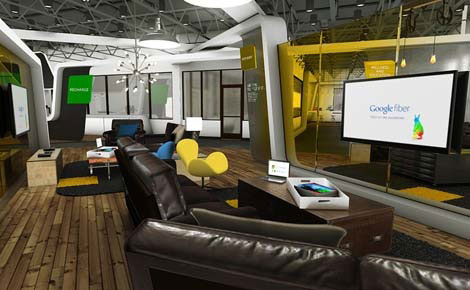Microsoft and Apple already have their own physical retail stores, but thus far Google has managed to resist that particular temptation
If a recent report from 9to5Google is to be believed though, that may not be the case much longer. According to a single “extremely reliable source,” Google will erect its own standalone stores by the holidays in an effort to more effectively push its hardware to consumers.
These stores will reportedly carry Google’s Nexus devices as well as Chromebooks, but the curious report goes on to note that Google conceived the project as a way to get its ambitious Glass project in front of more people. But is this all really necessary?
Let’s just say that these rumors are true — the value of something like Glass can be hard to discern without seeing what it brings to the table first-hand, but the more practical thing to do would be to leverage its existing partnerships. Google has a fair number of Chrome Zone experience areas already installed in existing retailers like Best Buy and PC World in the U.K., and those stores already get plenty of foot traffic (if perhaps less than in recent years). Even if Google had to pay for some more experienced folks to demo Glass, it could still be less expensive and potentially more impactful than going it alone in the retail space.
Sure, there’s something to be said for Google controlling that experience end-to-end the way Apple does, but that approach isn’t without its potential pitfalls. Putting Glass aside for a moment, Google may have a hard time turning a profit off these stores thanks to some of its other products — devices like the Nexus 4 smartphone and the Nexus 7 and 10 tablets are sold at or around cost, meaning that Google hardly makes any money on them. Google’s hardware then is something of a Trojan horse (and not all that different from what Amazon offers): it’s generally cheap and powerful enough to make it worth a purchase, and Google has been aiming to make up that money in Play Store revenue down the line.
That’s all well and good, but running a physical store takes a decent chunk of money. Rent is a pain, as are utilities, training and staffing costs, paying for interior design and fixtures; there’s a considerable amount of overhead that goes into a venture like that. Sure, Google could still make some money in the long run but it doesn’t seem like much of a sure thing unless Google manages to perform very, very well in terms of sales volume. If we’re looking at this whole situation purely in terms of dollars and cents, a big retail push seems like a very dicey decision.
Of course, that’s not to say this whole thing is completely impossible — Google may be going after more than just money. A move like this may serve to solidify Google as a real consumer brand instead of just that thing you use when you want to scour the Internet for, well, everything. That sort of shift in public perception could only help when it comes to pushing hardware products in the future, especially if Google really does end up creating ambitious new devices on its own. Rumors of a hi-res Chromebook Pixel have more or less petered out (thanks in large part to the incredibly sketchy way that its supposed existence was revealed), but the furor it caused shows rather nicely that there’s interest for that sort of high-end Chrome computing experience.
And to return the whole issue of Google Glass, the notion of carving out small retail locations to highlight new and novel Google-powered experiences isn’t without precedent. Consider Google’s Fiber Space in Kansas City — while it’s set up to provide in-person customer support for Google Fiber’s growing number of users, it’s also meant to showcase what the Fiber service is capable of. It’s a very pretty little area that Google has put together and it already plays home to at least a few Chromebooks, so it’s not inconceivable that Google would take that concept, tweak it a little, and transplant it into some “major metropolitan areas.”
Still, if true, this retail crusade would be a pretty drastic little about-face for Google. Google Shopping’s Sameer Samat told AllThingsD just this past December that the company doesn’t “view being a retailer right now as the right decision,” so either this is all bunk, or Google’s having to adjust to the sea change more rapidly than it expected.
